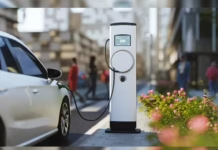Recent Comments
Delhi NCR Mahindra Boosts EV Service Capacity
Mahindra & Mahindra has expanded its Mahindra aftersales infrastructure across Delhi-NCR, adding new service facilities, deploying electric mobile units and opening a dedicated technical...
Noida BPTP Capital City Wins Commercial Honour
BPTP Capital City, a mixed-use commercial development in Sector 94, Noida, has been recognised at a national real estate industry forum in Mumbai, drawing...
NCR Businesses Face Smog Season Losses
India’s annual smog season is emerging as a measurable economic risk, with companies across real estate, retail and manufacturing flagging pollution-linked disruptions in their...
NCR Housing Market Gains Investor Momentum
The National Capital Region has re-emerged as one of India’s most closely watched property markets, with recent data showing robust capital appreciation across key...
Delhi Lutyens Bungalow Sale Nears 1000 Crore
A 3.2-acre private estate on Bhagwan Das Road in the capital’s Lutyens Bungalow Zone is poised to change hands in a transaction estimated at...







